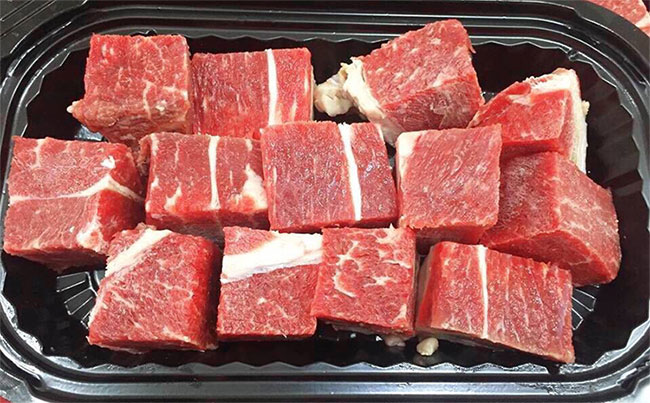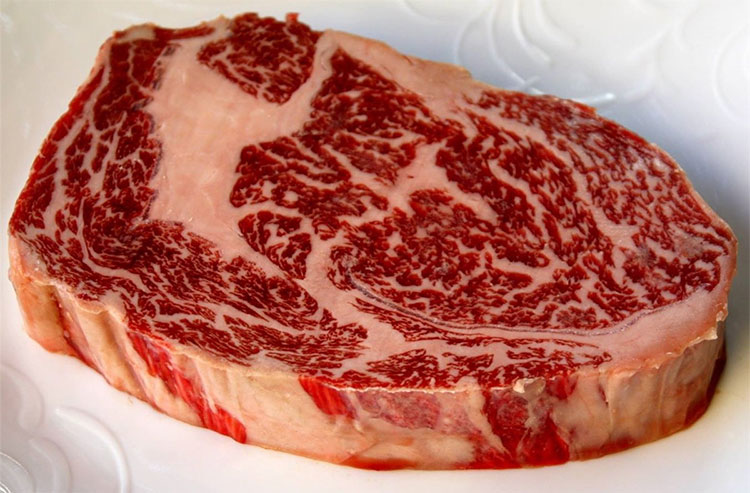What is the 'premium' American cow - this phrase is not used arbitrarily
The phrase "premium cow" can appear anywhere, from restaurants to beef wholesale markets. But this is not a phrase that can be used arbitrarily, at least with American cows.
When we go to a restaurant, or even buy beef from an importer, the phrase "premium cow" always appears in the menu. But is anyone confident that they can distinguish between Australian beef, American beef, Japanese beef, and quality is superior or secondary?

Beef trays are advertised as "premium" on social networks.
In fact, the best or not is mostly based on . advertisements of the seller. Sellers with a good heart are good cows, otherwise they will be of lower quality meat than price. Moreover, the premium phrase being used is somewhat rampant, because for many people who are "crawling" it is good and has been classified as superior.
Is the word " expensive" so cheap ?
Definitely not! In the US, the "premium" cow is a real concept, called a "prime" , and it is a standard issued by the US Department of Agriculture (USDA). Prime is actually also used to rank other meats - including veal and lamb - based on the criteria of succulence, taste and softness of the fiber.

A piece of US "Prime" grade beef.
These criteria are evaluated based on the grain texture and the "age" of the cow. About the fat, don't mistake it for the fat covering the meat. It must be the fat spots inside the grain, which increase the flavor and berryiness of the meat. As for age, the younger the cow (not calf), the softer the meat will be. So, the "prime" standard will be reserved for the youngest cows, and the most fat ones.
But because it is the highest quality meat, it cannot be grown and grown. A piece of meat coming from the "Prime" cow must have quality on top of the top. And according to USDA statistics, every year there is less than 2% of beef across the US through strict inspection to be labeled "Prime " only.

Price for "premium" Prime cow will not be cheap.
Of course, the price for " premium " Prime cow will not be cheap . According to reference from Costco - a famous chain of US wholesale shops, 1kg Prime beef tenderloin will cost about 800,000 / kg. If imported to Vietnam, the price will fluctuate around 1 million VND.
Distinguish ranked US cows
American cows rated "Prime" must have a USDA certification stamp. It has a shield image, and there is a clear "USDA Prime" on it. Stamps will be printed in the largest piece of meat, and in the packaging.

American cows rated "Prime" must have a USDA certification stamp.
But besides Prime, USDA also has 2 other ratings for only slightly less quality beef, which is Choice and Select. As follows:

American beef ranking.
- Prime - premium : the best quality meat, the fat surrounding the layer is low, the fat in the meat is very high.The meat tastes sweet, soft, succulent and very fragrant even without seasoning.Usually sold in high-end steak restaurants.
- Choice - premium grade : The meat is of very high quality, not equal to Prime.The amount of fat is less, the sweetness is not as good as the taste.
- Select - standard type : Meat is mostly lean, low in fat, but still delicious if processed properly.
There are also Standard and Commercial, which refer to frozen meat commonly sold in US supermarket chains.
In the US, it is illegal to say wrong ratings of meat
In the United States, if selling Prime meat without giving an inspection of meat quality (stamp), or using ambiguous language is considered illegal. For example, restaurants will not be allowed to name food as "prime rib", because it is confusing. It is not an arbitrary word.
- Licking arbitrarily can cause paralysis, death
- Nero Premium Edition v7.04 version is only 25.43 MB
- This information will startle the believers of sushi
- 10 premium dishes can burn your bag
- Super TB XDR TB - worrying new plague
- How does an airplane avoid hitting each other in the air?
- Science proves: Personality is the key to success, not wisdom
- Accidents caused by abuse of vitamin C
- Spinal pain, should not arbitrarily use analgesics and anti-inflammatory
- 'Buy one get two free' when upgrading Windows Vista
- Puppy mummy in the crypt
- ECS released the mainboard for Windows Vista
 'Fine laughs' - Scary and painful torture in ancient times
'Fine laughs' - Scary and painful torture in ancient times The sequence of numbers 142857 of the Egyptian pyramids is known as the strangest number in the world - Why?
The sequence of numbers 142857 of the Egyptian pyramids is known as the strangest number in the world - Why? History of the iron
History of the iron What is alum?
What is alum?